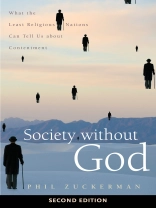An updated edition showcasing the social health of the least religious nations in the world
Religious conservatives around the world often claim that a society without a strong foundation of faith would necessarily be an immoral one, bereft of ethics, values, and meaning. Indeed, the Christian Right in the United States has argued that a society without God would be hell on earth.
In Society without God, Second Edition sociologist Phil Zuckerman challenges these claims. Drawing on fieldwork and interviews with more than 150 citizens of Denmark and Sweden, among the least religious countries in the world, he shows that, far from being inhumane, crime-infested, and dysfunctional, highly secular societies are healthier, safer, greener, less violent, and more democratic and egalitarian than highly religious ones.
Society without God provides a rich portrait of life in a secular society, exploring how a culture without faith copes with death, grapples with the meaning of life, and remains content through everyday ups and downs. This updated edition incorporates new data from recent studies, updated statistics, and a revised Introduction, as well as framing around the now more highly developed field of secular studies. It addresses the dramatic surge of irreligion in the United States and the rise of the “nones, ” and adds data on societal health in specific US states, along with fascinating context regarding which are the most religious and which the most secular.
A propos de l’auteur
Phil Zuckerman is Professor of Secular Studies and Sociology and Associate Dean of Faculty, Secular Studies and Sociology Field Groups, Pitzer College. Among other books, he is the author of Strife in the Sanctuary: Religious Schism in a Jewish Community, as well as our Society Without God: What the Least Religious Nations Can Tell Us About Contentment and Beyond Doubt: The Secularization of Society.







![Couverture du Brian Schrag & Julisa Rowe: Community Arts for God's Purposes [Chinese] 貼近神心意的社群藝術 Couverture du Brian Schrag & Julisa Rowe: Community Arts for God's Purposes [Chinese] 貼近神心意的社群藝術](https://static.worldofdigitals.com/thumb_webp/740/9781645083740.webp)




